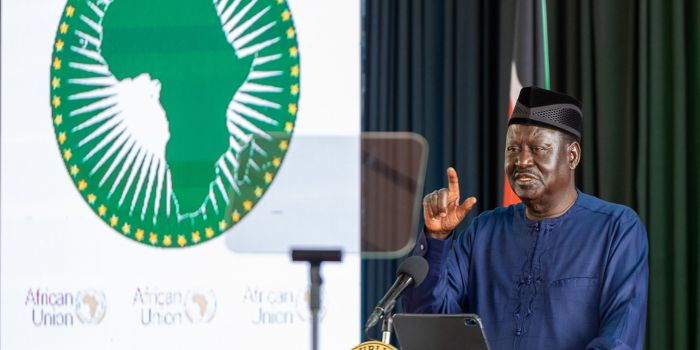Amina Mohamed’s candidacy for the African Union chair in 2017 was considered a perfect move based on her credentials which included serving as a Cabinet Secretary in the Ministry of Foreign Affairs (2013-2018), a Permanent Representative to the UN (2000-2006), Chair of the International Organization for Migration (IOM), Assistant Secretary-General and Deputy Executive Director of the United Nations Environment Programme and the chair of the World Trade Organization’s General Council (2005).
Given her outstanding qualifications, Kenya launched an ambitious continent-wide campaign to promote her candidacy. The strategy combined direct high-level diplomatic meetings with strategic outreach to regional voting blocs and alliances to build support for her bid.
Despite her strong credentials and a campaign that cost Ksh437.7 million, she was ultimately defeated by Mahamat Moussa Faki of Chad. Faki brought significant experience to the role, having served as Chad’s Prime Minister from 2003 to 2005 and Minister for Foreign Affairs from 2008 to 2017. He had also held prestigious international positions, chairing both the African Union Peace and Security Council in September 2013 and the UN Security Council in December 2015.
Sports CS Amina Mohamed speaking during the ground breaking ceremony of Jomo Kenyatta International Stadium at the ASK Kisumu Showground in Mamboleo, Kisumu County on June 24, 2020.
Amina Mohamed / Twitter
In the initial round of voting, Amina secured a narrow lead with 16 votes compared to Moussa Faki’s 14, while additional candidates shared the remaining ballots. Since the rules required a two-thirds majority to declare a winner, the election continued through seven more rounds, during which lower-performing candidates were asked to withdraw. The contest concluded in the seventh round when Faki emerged victorious after obtaining 38 votes, exceeding the required two-thirds threshold.
The Amina Mohamed Lesson
Kenya’s government established a task force to spearhead Amina’s campaign, but its effectiveness was hampered by its composition. Led by then-Interior Cabinet Secretary Dr. Fred Matiang’i, the team was predominantly made up of politicians rather than seasoned diplomats or foreign relations experts. This choice of personnel, especially given Matiang’i’s limited diplomatic background, created a mismatch between the campaign’s diplomatic requirements and the team’s expertise.
Raila Odinga’s effective strategy
Drawing lessons from Amina Mohamed’s failed AU chairperson’s bid, President William Ruto was keen in crafting an effective campaign strategy that included unveiling the right campaign secretariat that was well-versed in diplomacy and experienced in African and international relations.
A photo collage of African Union Commission Chairperson candidates Mahmoud Ali Yousouff (Djibouti), Richard Randriamandrato (Mauritius) and Raila Odinga (Kenya).
Photo
Mwanawanjuguna
The campaign secretariat features a powerhouse team of experts combining diplomatic, political, and technical expertise. Led by Foreign Affairs Principal Secretary Korir Sing’oei, it includes diplomatic heavyweights like former U.S. Ambassador Elkanah Odembo, IGAD Executive Secretary Mahboub Maalim, and Ambassador Anthony Okara. The team also brings together legal expert Prof. Makau Mutua, financial specialist and former Nyeri Deputy Governor Dr. Caroline Karugu, data and security expert Raymond Omollo who is the Principal Secretary for Ministry of Interior and National Administration. Joseph Busiega, Chief of Staff in the Prime Cabinet Secretary’s office, contributes his international relations expertise, while Aurelia Rono, Principal Secretary for Parliamentary Affairs, oversees diplomatic relations with AU countries. Rounding out the team is digital strategist Pauline Njoroge, who handles communications.
Kenya has strategically engaged with major African regional blocs to build support for its bid. Beyond hosting East African Community (EAC) presidents, the country has conducted extensive diplomatic outreach across the continent’s influential regional organizations. These include the Arab Maghreb Union (UMA), Common Market for Eastern and Southern Africa (COMESA), Community of Sahel-Saharan States (CEN-SAD), Economic Community of Central African States (ECCAS), Economic Community of West African States (ECOWAS), Intergovernmental Authority on Development (IGAD), and the Southern African Development Community (SADC).
Kenya’s current bid for the African Union Commission chairmanship through Raila Odinga represents a carefully recalibrated approach to continental leadership. Learning from Amina Mohammed’s 2017 campaign, which stumbled due to coordination issues and limited regional backing, Kenya has now adopted a more sophisticated diplomatic strategy. Odinga brings substantial credentials to the race, combining decades of domestic political experience with deep involvement in continental affairs. However, his path to victory faces notable hurdles, particularly from Djibouti’s candidate Mohamoud Youssouf and the complex political dynamics within the East African Community. The outcome of Kenya’s diplomatic campaign in the next two days will not only determine its success in securing this prestigious position but also shape its influence in both African and global affairs.
President William Ruto with a section of African Union leaders during the opening session of the Retreat of the Extended Bureau on the Implementation of Institutional Reforms of the African Union, State House, Nairobi on January 27, 2025.
Photo
PCS


